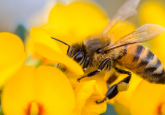Science in Fiction

This World Book Day, we feature some leading scientists who also share a passion for fiction.
With the arrival of World Book Day, we thought it apt to speak to some of the researchers and life scientists who are also published authors of fiction. In this ‘Science in Fiction’ series we discuss: the process of including and explaining complex science in novels without losing the reader’s attention; the importance of grounding the science in reality; the potential for this information to change opinions and even to enact social change.
19231
In the first interview of the series, Sue Pillans, an Australian marine scientist and graphic recorder, takes us through the vital importance of communicating science to children from a young age, in a positive yet realistic manner. This is something that Sue dedicates a lot of her time through her alter ego Dr Suzie Starfish, traveling to schools and educating the children on humanity’s impact on the oceans. We also speak to Sue about her illustrated novels, starting with “The Great Barrier Reef Thief,” and the inspiration behind them.
Read the full interview with Sue Pillans here: Science in fiction: an interview with Sue Pillans
19226
Next is Carol Potenza. Having spent 15 years as a plant geneticist, Carol turned to writing after becoming a lecturer and finding more time in her life once her children moved out. A few years later Carol was a published, award-winning author of the thriller “Hearts of the Missing,” a murder mystery set on a Native American reservation, which interweaves Carol’s in-depth knowledge of genetics into the fascinating landscape of Native American culture and ancestry.
Read the full interview with Carol Potenza here: Science in fiction: an interview with Carol Potenza
19241
Finally, Balkees Abderrahman, a postdoctoral research fellow at the MD Anderson Cancer Center (TX, USA) addresses the genre of science fiction itself and highlighted its importance in inspiring discoveries. Balkees also introduced us to her personal philosophies and explained how she uses them in her novels to challenge people’s preconceptions and to influence society.
Read the full interview with Balkees Abderrahman here: Science in fiction: an interview with Balkees Abderahman
Take a look at these fascinating interviews and get a sense of the creative process behind writing a successful, interesting and informative piece of fiction.





